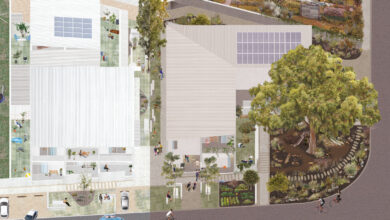
Foreground reads: our picks from around the web in July
Here’s our eclectic recommended reading list for July: NAIDOC week-themed celebrations (because of her we can), permaculture’s shift to mainstream, old trees’ fate in the balance, the cost of ditching freeways, cleaning up Paris’ canals, and the next housing battleground: golf courses.
We are life givers, leaders and fighters. We’ve overcome the odds by being here
The theme of this year’s NAIDOC Week is ‘Because of her, we can!’ This recognition is overdue, writes Jackie Huggins. Source: The Guardian
Removal of sacred Djap Wurrung trees an ‘act of cultural terrorism’
A protest camp and tent embassy have been set up to stop the bulldozing of sacred trees for the new Western Highway. Source: SBS / NITV
Permaculture village’s radical ideas becoming mainstream 30 years on
An eco village on the Sunshine Coast was an experiment in communal living when it first started. Thirty years later the village is still thriving, and the rest of Australia is catching on to some of its pioneering ideas. Source: ABC News
Native bush food helping remote community thrive
At Engonnia, a one horse, one pub town in far western New South Wales, the locals are learning to keep their heads down. It’s bush tomato season. Source: ABC Landline
The law of large numbers
How much does it cost to stop a freeway? Source: Inside Story
Let’s All Swim in the Once-Filthy Canals of Paris
Unlike many cities, the French capital has made good on its promise to re-open urban waterways to bathers. How did they do it? Source: CityLab
Smart city planning can preserve old trees and the wildlife that needs them
Once revered as an icon of the unique Australian landscape, old trees are rapidly becoming collateral damage from population growth. Source: The Conversation
Can Andy Byford Save the Subways?
The new president of the New York City Transit Authority wants to make the trains (and buses) run on time. It won’t be easy. Source: The New Yorker
The next housing battle ground: dead golf courses
As the sport’s popularity wanes, vast amounts of underutilized land will open up. Can it be developed? Source: CityLab


